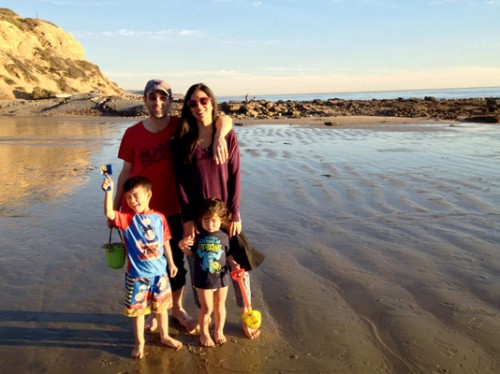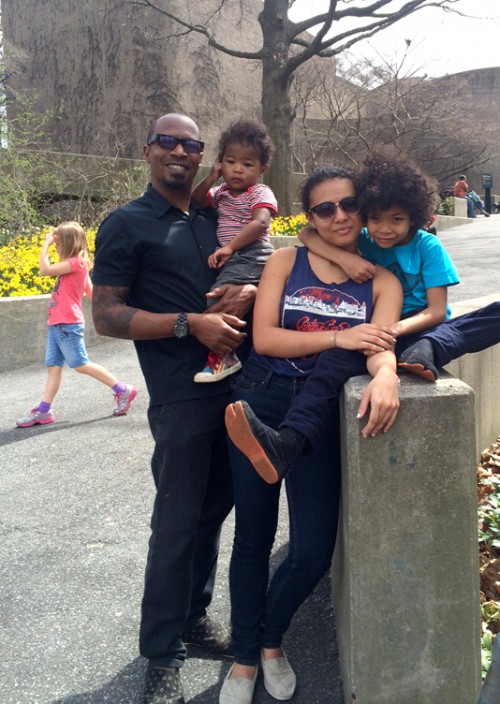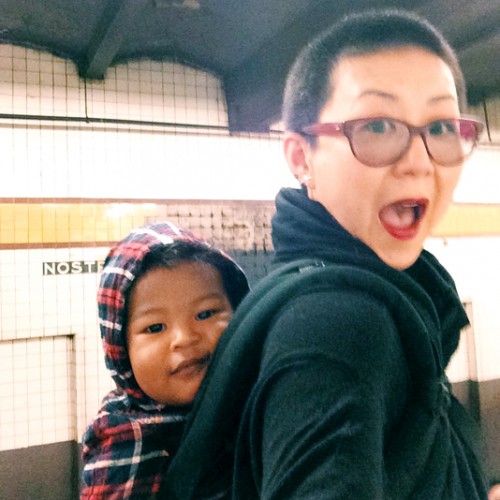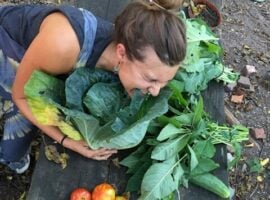To celebrate Mother’s Day this Sunday, we asked mothers working in food justice how motherhood has impacted their work. We got so many responses that we’re splitting them into a two-part series. Happy Mother’s Day!
JOANN LO, Food Chain Workers Alliance

Has being a mother affected your approach to and perspective of your work? In what way?
I think becoming a mother has made me more dedicated to my work for social and economic justice. I used to think about what kind of world I wanted as motivation to continue in this long-term struggle, and now I think about what kind of world do I want my kids to have and how can I ensure that they can have food that is nutritious and sustainably produced and provided by workers all along the food chain who are treated fairly and respectfully.
Why do you think it is important that there are women and mothers working in food justice?
I think women and mothers are often more strongly and negatively impacted by the injustices of the current industrial food system – from lower wages, sexual harassment and assault, discrimination in the workplace and by the predominantly white men who hold political and corporate power… So women and mothers need to be in the leadership of the food justice movement – we know firsthand what the problems are and therefore what the solutions are. And in my experience, I know and have collaborated with more women and mothers than men in the food justice and food sovereignty movements.
Do you and your family have a favorite meal to make and eat together?
My kids would probably say that they love making cookies with me. My son has also gotten pretty good at chopping up carrots and broccoli with me to make a veggie and tofu stir-fry.
AKI HIRATA-BAKER, Adopt-a-Farmbox
 The words ‘responsibility’ and ‘honesty’ took on new meanings. I always thought it was important to be a responsible and honest citizen, friend, partner, etc. But when I became a mother, I found deeper meanings of these words within myself, rather than the outward meaning I gave them for a long time. As I see my kids grow, I see so many pieces of myself in them, some of them good and a lot of them not so pleasant. These are the things they picked up without my conscious effort. All the habits, fear, biases, I wish to ignore in myself were clearly displayed in my children, along with my good eating habits and polite mannerism. How can I call myself a responsible parent if I let them inherit what I see as a problem in myself?
The words ‘responsibility’ and ‘honesty’ took on new meanings. I always thought it was important to be a responsible and honest citizen, friend, partner, etc. But when I became a mother, I found deeper meanings of these words within myself, rather than the outward meaning I gave them for a long time. As I see my kids grow, I see so many pieces of myself in them, some of them good and a lot of them not so pleasant. These are the things they picked up without my conscious effort. All the habits, fear, biases, I wish to ignore in myself were clearly displayed in my children, along with my good eating habits and polite mannerism. How can I call myself a responsible parent if I let them inherit what I see as a problem in myself?
 Self-reflection and self-examination regarding everything I see as part of myself became part of my parenting routine, and being honest with my mistakes and flaws is challenging yet very rewarding. Then it hit me, they are really raising me by being who they are.
Self-reflection and self-examination regarding everything I see as part of myself became part of my parenting routine, and being honest with my mistakes and flaws is challenging yet very rewarding. Then it hit me, they are really raising me by being who they are.
All that being said, my children have trained me to be a person who fights for justice – because I am responsible to make the world better, for my children and their generation. With all the lessons they have given me to be a better person, I owe them that much, to say the least.
JULIE WASHBURN, Executive Director at Washington Food Coalition
 Has being a mother affected your approach to and perspective of your work? In what way?
Has being a mother affected your approach to and perspective of your work? In what way?
As a mother, I’m so much more aware of the pain that individuals feel at the prospect of not being able to feed their children. It’s one thing to imagine how you’d feel if you went lacking adequate nutrition, but there’s an immense burden of responsibility in regards to caring for precious little ones who rely on you.
I’ve come to understand how unbelievably impactful a hungry tummy can be for children. While I’m so fortunate to be able to provide my children with regular nourishment, I’m acutely aware that their behavior can become dreadful if I don’t make sure they are well fed. This is especially true for my toddler. Running late on a mealtime for a child often turns into a temper tantrum that tests my patience, and missing a meal would be heartbreaking and exhausting.
Why do you think it is important that there are women and mothers working in food justice?
As mothers, we develop a deeply rooted second nature that is concerned for the wellness of others. Food is the foundation for wellness, whether it’s for our own children or our neighbors (nearby or global). This is an important perspective to have at the table when it comes to seeking food justice.
Do you and your family have a favorite meal to make and eat together?
Lately we’ve really gotten in to Taco Tuesdays together. Homemade meals happen almost every night in our house, but as a full time working mom that is no easy task to accomplish. Taco Tuesdays are quick and easy, and the whole family loves the food. I mix it up sometimes with crock pot meat, soft or hard shells, etc.
Stay tuned for Part 2 of Mothers in Food Justice!





